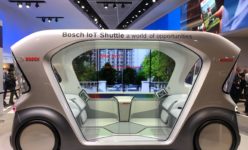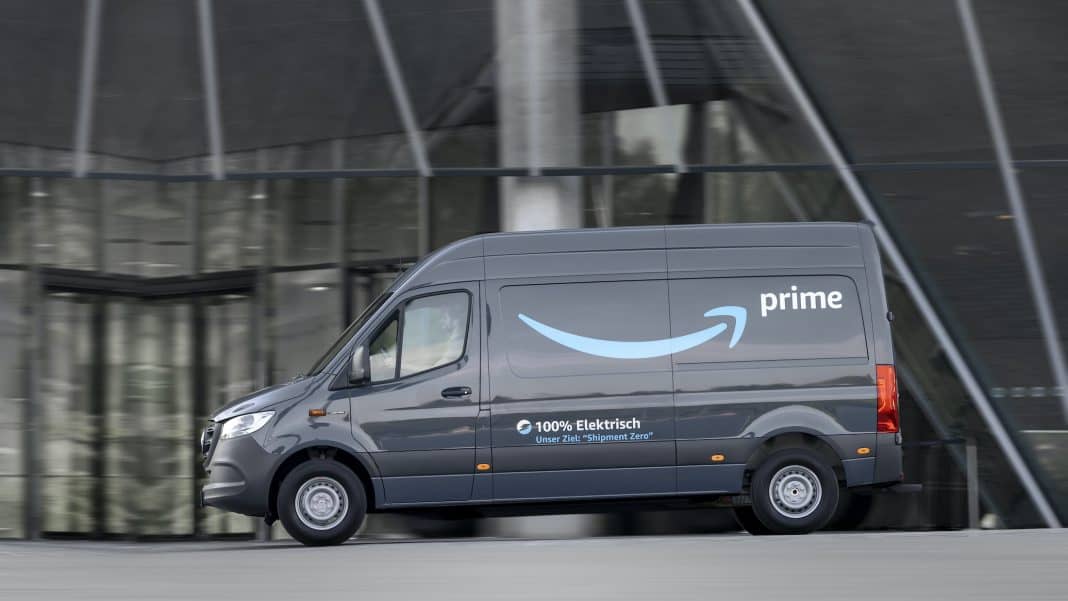It is one of the biggest deals in the electric commercial vehicle segment announced today by German manufacturer Mercedes-Benz and eCommerce giant Amazon. This is because both companies announced last night that more than 1,800 battery-powered eVito and eSprinter vehicles from Mercedes-Benz Vans will be delivered to Amazon starting this year. Used for urban centers in Europe.
Which vehicles will Amazon buy for use in Europe?
Amazon’s order here in Europe to Mercedes-Benz Vans comprises around 600 medium-sized electric Vito and more than 1,200 electric vehicles of the large-size van eSprinter. I’ve already driven both electric vans for a test drive within the last two years. Here, for example, is a field report on the eVito from last August in Spandau. The electric vans and the electric cars from Mercedes-Benz have been driving on German roads for several months.
The drivers of the electrification of the van fleets on the last mile are the CEP service providers
In recent months, it is primarily the courier, express and parcel service industry (CEP) that has been driving forward the electrification of vehicle fleets. The electrification of last mile traffic has picked up momentum thanks to the efforts of Amazon, DHL, DPD, Hermes, UPS, etc. Delivery services are changing their services and focusing on alternative drives.
For example, increasing online trade and flexible delivery services in recent years have not only led to an increase in urban delivery traffic, but have also led to a growing focus on locally emission-free drives in densely populated areas. Many city centers are now turning to sustainable delivery methods. End customers and business customers are now also increasingly demanding emission-free delivery of their goods. Not only since the beginning of the Corona crisis, customers have been increasingly turning to online trading and delivery via e-mobility.
Intelligent charging infrastructure for the e-transporters of fleet operators
In addition, there are good prerequisites for the use of electric transporters, especially in the CEP sector: tours that can be easily planned and are manageable in terms of length and distance help in the use of electric transporters. At the distribution centers of the logistics companies there is sufficient space for the development of suitable, appropriate charging infrastructure thanks to larger areas. Intelligent charging systems help the logistics companies to get their fleets on the road on time, often charging is done at night.
For customers in urban centers, on the other hand, the use of electric vans has advantages. Because in addition to emission-free delivery, the noise level of the electric vans is virtually zero.
How long have Mercedes-Benz Vans and Amazon been working together in the field of electric mobility?
Mercedes-Benz Vans and the online mail-order company Amazon Logistics Deutschland recognized the potential for cooperation in the field of electromobility as early as 2018. The Amazon distribution center in Bochum was already equipped with charging infrastructure back then. This was followed in July 2020 by LUEG basecamp GmbH, Europe’s largest contiguous charging infrastructure with around 340 charging points at the Amazon location in Essen. And the two companies Amazon and Mercedes also work together in the international field.
Who are the competitors to the electric vans from Mercedes-Benz?
Only recently, the competitor General Motors announced the construction of electric vans for its customers such as Amazon and UPS. Last January, the logistics company UPS ordered 10,000 electric vans from the British company Arrival. These e-transporters will be integrated into the logistics service provider’s fleet within the next four years. Another case comes from France: the local French competitor Renault relies on its electric Master Z.E. Transporter and uses it with many customers in Paris, Lyon or Marseille. So far, Mercedes has been very successful here with its smaller vans, the Citan.
Mercedes-Benz joins “The Climate Pledge”
The Climate Pledge’, a climate protection initiative founded by online retailer Amazon and Global Optimism, set itself the goal of acquiring companies that want to achieve CO2 neutrality ten years before the Paris Climate Protection Agreement. Mercedes-Benz supports this goal with “Ambition2039”.
Ola Källenius, Chairman of the Board of Management of Daimler AG and Mercedes-Benz AG: “At Mercedes-Benz we have set ourselves the ambitious goal of making the transformation of mobility a success story. By joining ‘The Climate Pledge’, we are reaffirming our ambition to consistently pursue the path towards emission-free mobility and sustainable vehicle production. Together with Amazon, Global Optimism and the other companies involved, we are pursuing the goal of being CO2-neutral by 2040 – ten years earlier than the Paris Agreement”.
My conclusion on the order of the 1,800 E-transporter from Amazon at Mercedes-Benz
It is precisely these signals from two global mobility participants that are needed today for the market penetration of innovations in urban centers. The establishment of efficient charging stations for the electric cars, the electric tourers from Mercedes-Benz, whose batteries and power consumption are ideally suited for the shipments of the online mail order company, is the way of the future. The Prime recipient appreciates the fast delivery – for his book or the brand articles.
E-mobility is gradually gaining acceptance for last mile delivery. The signal from Amazon, with its logistics fleet, to rely on electricity and the electric vans eVito and eSprinter from the latest Mercedes-Benz model series cannot be emphasized enough. This will do something for e-mobility in Europe. The large parcel service provider is expressly backing fully electric panel vans immediately, and not initially plug-in hybrids. The electric drive provides sufficient energy thanks to the lithium-ion batteries for the use of the vans for prime customers and for delivery to the customers. The demand for the electric Sprinter and the eVito from the Daimler Group shows that the Stuttgart-based commercial vehicle manufacturer is placing its vehicle offering in the logistics sector at the right time in order to minimize CO2 emissions together with its customers.






















